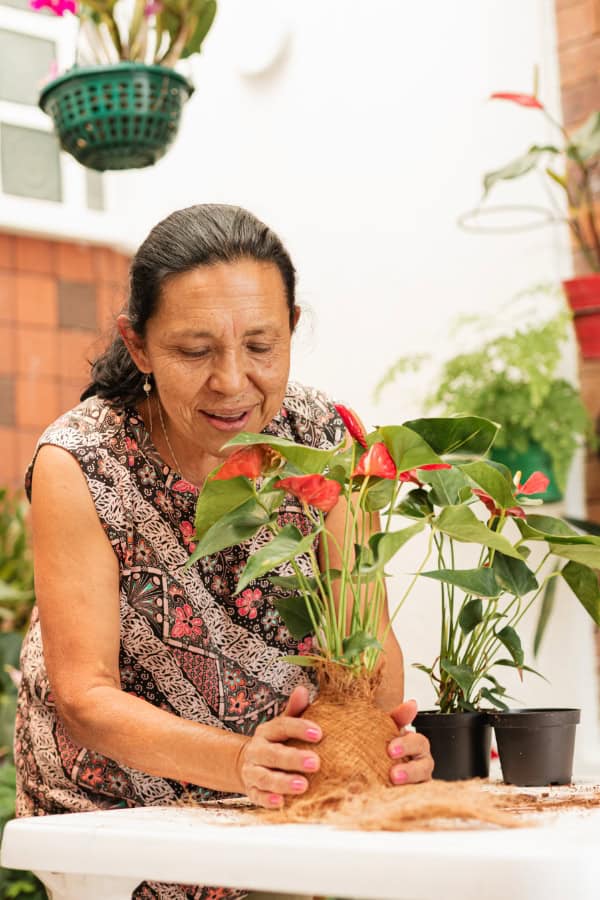Hospice Care for Alzheimer’s Disease & Dementia
Care Services
The Role of Hospice Care in Alzheimer’s Hospice care is a lifeline for families navigating the challenges of advanced Alzheimer’s…















The Role of Hospice Care in Alzheimer’s
Hospice care is a lifeline for families navigating the challenges of advanced Alzheimer’s disease. Our specialized team offers physical, emotional, and spiritual support to patients and their loved ones, ensuring comfort and dignity every step of the way.
Hospice care plays a key role by:
- Managing symptoms like agitation, pain, and difficulty swallowing.
- Offering emotional counseling to help patients and families cope with the progression of the disease.
- Providing guidance on care decisions and end-of-life planning.
When Should Hospice Care for Alzheimer’s Begin?
Recognizing when it’s time for hospice care can be difficult, but the earlier it begins, the more support you and your loved one can receive.
Hospice care may be appropriate if:
- Your loved one is in the late stages of Alzheimer’s disease.
- There are significant declines in cognitive or physical abilities.
- The patient experiences frequent infections, weight loss, or difficulty swallowing.
Early involvement in hospice care provides time to plan for meaningful end-of-life experiences and focus on quality of life.
How Hospice Care for an Alzheimer’s Patient Works
Hospice care for Alzheimer’s patients focuses on comfort, dignity, and ensuring every moment is as peaceful as possible.
Here’s how hospice care works:
- Symptom and Pain Management
- Addressing restlessness, agitation, and physical discomfort.
- Providing medications to ease symptoms and promote relaxation.
- Caregiver Support
- Education on how to interact with and care for someone with Alzheimer’s.
- Respite care to give caregivers much-needed breaks.
- Emotional and Spiritual Guidance
- Counseling for families to process grief, stress, and caregiving challenges.
- Chaplains or spiritual advisors to provide solace and hope.
- End-of-Life Preparation
- Ensuring the patient’s environment is peaceful and comforting.
- Creating opportunities for families to share meaningful moments with their loved ones.
What to Expect at the End of Life
The end-of-life stage can be an emotionally overwhelming time, but hospice care ensures that no one faces it alone.
Expect the following:
- Physical Changes
- Increased sleep, reduced appetite, and difficulty swallowing.
- Slower breathing and changes in circulation, such as cold hands and feet.
- Emotional Needs
- Patients may show signs of restlessness or confusion.
- Families may experience anticipatory grief, and hospice provides counseling and support.
- Care Goals
- Focus on comfort, with an emphasis on reducing pain and distress.
- Creating an environment filled with love, calmness, and dignity.
How Alzheimer’s Disease Affects Daily Life
Alzheimer’s impacts every aspect of daily life, making it harder for patients to maintain independence.
Common challenges include:
- Memory Loss: Forgetting names, routines, and personal history.
- Confusion: Difficulty recognizing loved ones or navigating familiar places.
- Communication Issues: Trouble finding the right words or following conversations.
- Behavioral Changes: Increased anxiety, agitation, or aggression.
Hospice care helps manage these challenges by offering tools, resources, and compassionate support.
Challenges of Caring for Dementia Patients at Home
Caring for someone with Alzheimer’s at home can be rewarding but also incredibly challenging. Hospice provides the support caregivers need to navigate this demanding role.
Common challenges include:
- Managing behavioral changes like wandering or agitation.
- Balancing caregiving with personal and professional responsibilities.
- Addressing physical needs, such as feeding and mobility assistance.
- Coping with emotional strain and caregiver burnout.
Hospice care offers resources, education, and respite to make caregiving more manageable.
Care in the Last Stages of Alzheimer’s Disease
During the final stages of Alzheimer’s, care shifts from prolonging life to enhancing comfort and dignity.
Care in this stage involves:
- Ensuring a calm, safe, and familiar environment.
- Addressing physical needs like bathing, feeding, and mobility with gentle, patient care.
- Providing emotional reassurance through touch, music, or soft conversation.
How to Make Someone with Late-Stage Alzheimer’s More Comfortable
Small, thoughtful actions can help soothe and comfort your loved one in the late stages of Alzheimer’s.
Practical tips include:
- Maintaining a consistent daily routine to reduce confusion.
- Using soft lighting and calming music to create a peaceful environment.
- Offering gentle physical touch, like holding hands or a light massage.
- Using adaptive tools to make feeding or mobility easier.
What to Do About Incontinence
Incontinence is a common issue in the later stages of Alzheimer’s, but it can be managed with the right tools and support.
Tips for managing incontinence include:
- Using protective undergarments or bed pads.
- Keeping a consistent bathroom schedule to prevent accidents.
- Ensuring proper skin care to avoid irritation.
- Consulting hospice professionals for additional strategies and support.
Hospice Eligibility for Dementia
Not every patient with Alzheimer’s is eligible for hospice care, but specific criteria can help determine when it’s time to transition to comfort-focused support.
Eligibility guidelines include:
- A diagnosis of late-stage Alzheimer’s or dementia.
- Inability to perform basic activities of daily living (e.g., eating, bathing).
- Significant weight loss or difficulty swallowing.
- Frequent infections, like pneumonia or UTIs.
- A prognosis of six months or less if the disease follows its natural course.